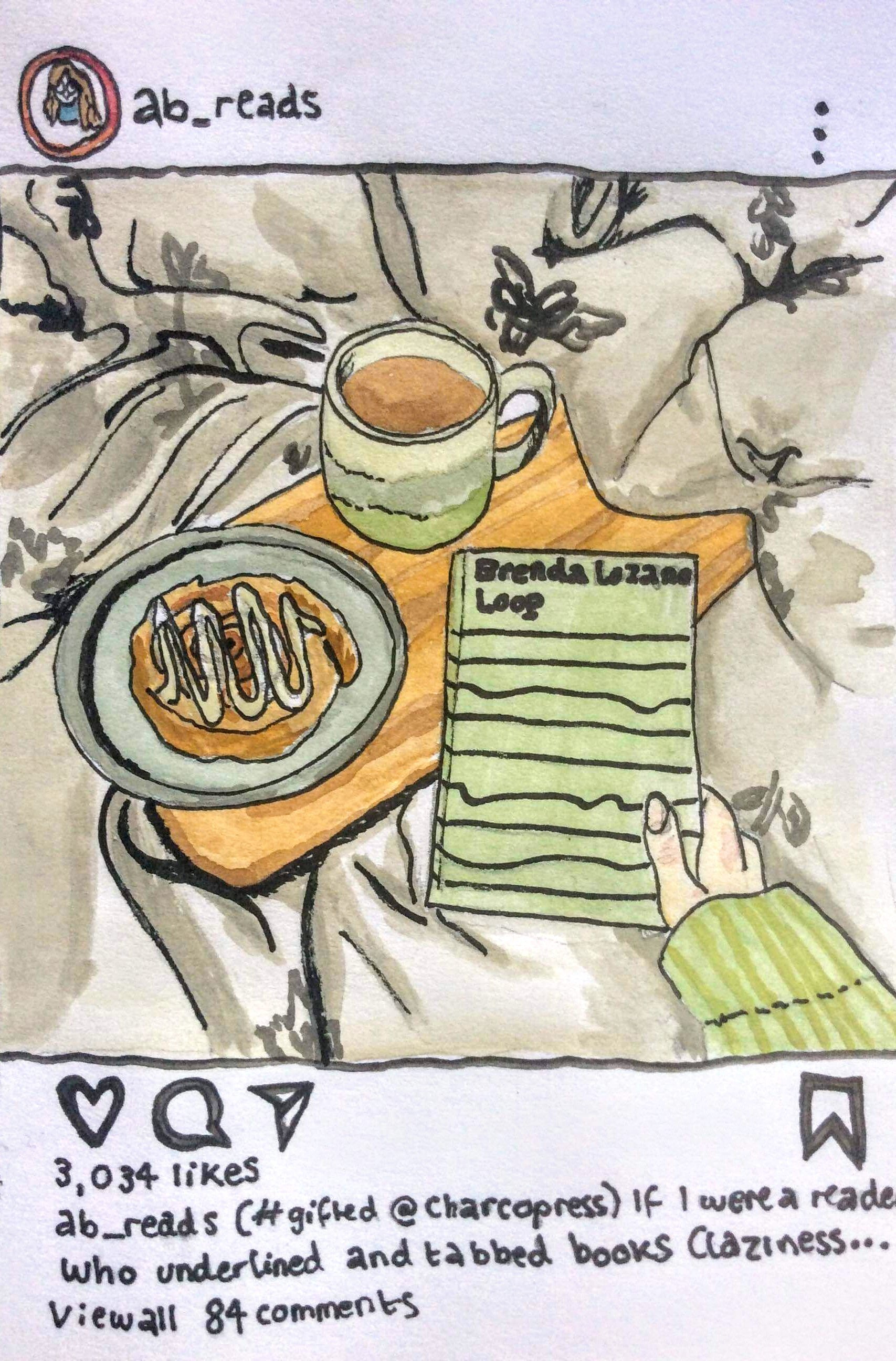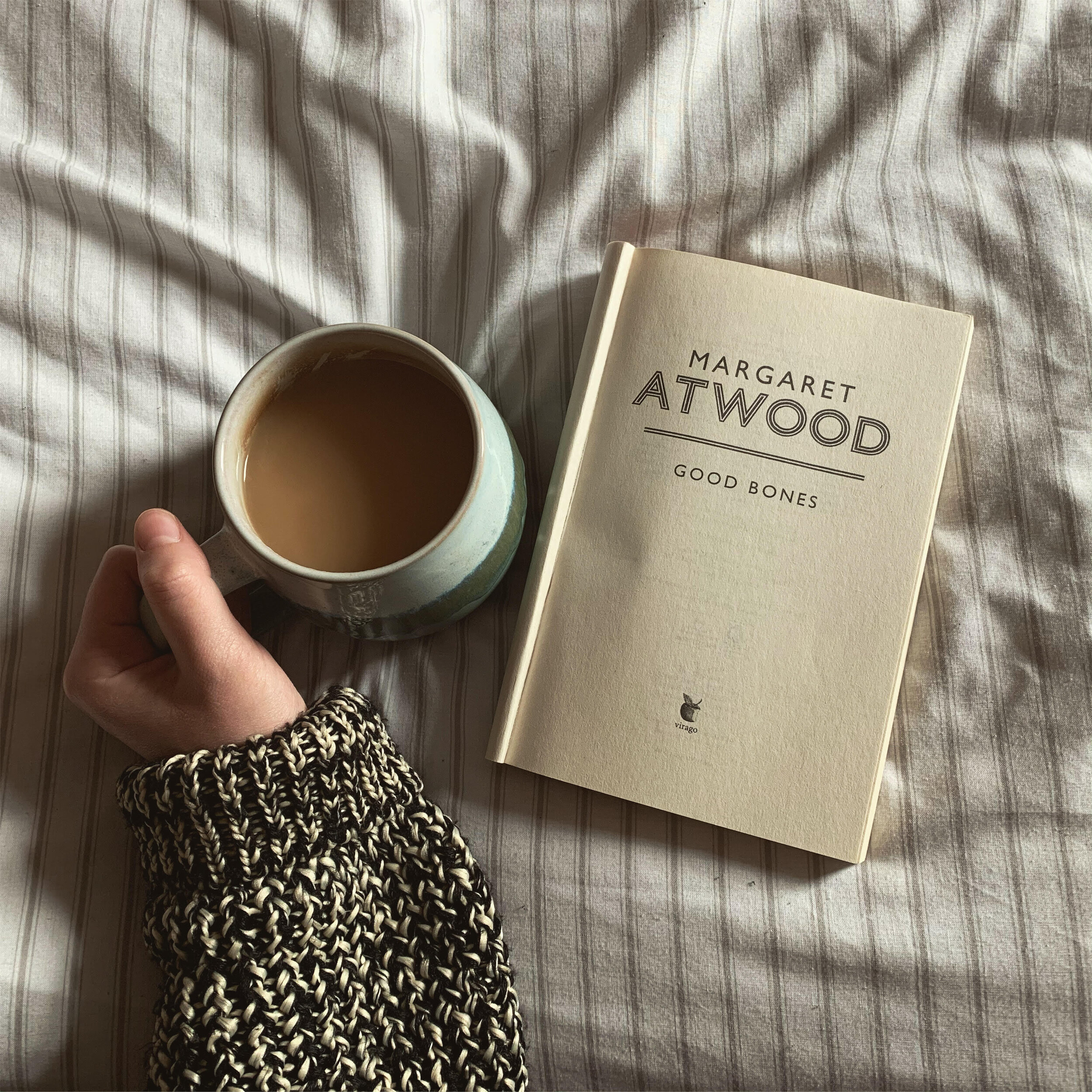Introducing Abbie Walker, Durham’s Resident Bookstagrammer
Illustrated by Samantha Fulton.I have always been wary of social media. Perhaps it is because I know myself too well. I know my easily-distracted nature, my ability to endlessly watch other people paint and dance and braid hair, knowing full well I’ll never get around to learning those things myself — unless I put down my phone.
‘Bookstagram’ accounts — Instagram accounts dedicated to book reviews — seem a more thoughtful way to use social media, mashing together pretty aesthetics with more serious reflection. I was curious, then, to speak to Abbie Walker, whose account @ab_reads was named Bookstagrammer of the Year by the London Book Fair.
Abbie was an undergraduate student at Durham when she started her bookstagram account. Fond of Durham and keen to stay, she now runs @ab_reads from her home on Claypath. We met via Skype. The familiarity of her setting, the rotating computer chair and plain walls, her shy smile and friendly tone, contrasted with the common image of an Instagram 'influencer': aggressively positive, unattainably flawless. Could it be that the life portrayed by @ab_reads was a realistic reflection of the life lived by Abbie?
Abbie did not create the account with the aim of one day being named Bookstagrammer of the Year. @ab_reads started out as a visual journal for personal reflection and, whilst we might not expect it of an account with 71.2k active followers, I am convinced that it has remained true to that original purpose.
READ WHAT MAKES YOU HAPPY
When asked how she chooses which books to read, Abbie shrugs as if this is not something she worries too much about. “I read what I want to read,” she states simply, going on to say, “there is pressure to read classics, as if they’re worth more, and the classics should not be forgotten. But I try not to limit myself to just classics, or just award-winners, or any one particular genre.”
Nowadays, publishers send Abbie free copies of upcoming titles. “At first, I was so excited that I could get books for free through my work! I realised, however, that the books publishers want to promote are not always ones I will enjoy.” And so, Abbie has not given up on finding books for herself in Durham's many charity shops and the recommendations of friends.
“And sometimes, it’s comforting to re-read an old favourite. Don’t feel that’s a waste of time. As much as you can, read what makes you happy.”
It is inevitable that some books will not receive a five-star rating. Abbie never forces herself to finish a book for the sake of finishing it. “Sometimes on my bookstagram, I'll simply write ‘I did not finish this book’.” However, she does not give up easily.
“I definitely persevere more now, than when I first started @ab_reads. I’ve become more critical. I am very conscious of the fact that my following is much broader than just my friends and family. I need to make sure my reviews are balanced and that I give books a fair chance.”
STUDENTS: THERE’S NO SHAME IN NOT UNDERSTANDING
Her advice to students on how to approach difficult books is: “don’t try too hard. Sometimes when you feel like you have to find some deeper meaning, you get lost. What’s the phrase? You can't see the forest for the trees. There's no shame in not understanding.”
Although she concedes that there are situations in which we must read books that we wouldn’t choose for ourselves, Abbie’s main message is always that reading should be for pleasure, relaxation, reflection. I take comfort in this.
I ask if Abbie sets herself reading goals, especially now there is the pressure to regularly publish posts on her bookstagram. She says she “loves challenge”, but prefers what she calls “content goals” to goals based on reading a certain number of books within a certain timeframe.
Her current goal is to read one book from every country in the world. “Too often, we overlook translated works,” says Abbie, “but doing so really narrows our horizons.” She recommends The Eighth Life (for Brilka) by Georgian author Nino Haratischwili. “I can never pronounce the name!” Abbie laughs. “It’s epic, it’s amazing, a beautiful multigenerational family saga, with a cursed hot chocolate recipe to boot!”.
Expanding into translated works “teaches us about other cultures and ways of thinking, but at the same time reminds us that we are not fundamentally different from people in other countries. It encourages further learning — keeps us curious.”
THE MOST POWERFUL SETTING IS HOME
That said, the importance of books about home should not be disregarded. Our conversation winds back to Durham and the North-East region.
“There is little representation of the North-East in British literature,” says Abbie, “and if you grow up in a region that is never mentioned in the books you read, you come to believe that your region is not important, that people from your region are not important. No one's writing about you.”
“People from the North-East can sometimes lack ambition. Maybe if they recognised the places in the books they read, they’d take more joy in the stories, and recognise themselves more in the characters. And they’d think: if this character can write a book or solve a crime, maybe I can too.”
YOU ARE NOT ALONE
Bookstagram posts are more colloquial than formal reviews. Abbie often takes a chatty tone: “And now a teeny tiny review of this teeny tiny book!”. But that might play a part in her popularity. Abbie is keen to remind me that bookstagram is not about professional marketing or sponsorships. It’s not about “being clever and literary.” It’s about encouraging people to read.
With posts regularly generating upwards of 200 comments, I think it is fair to say that Abbie is succeeding. @ab_reads predominantly attracts young women. Of her 71.2k followers, 84% are female, 45% are between the ages of 25-34, and 30% are between the ages of 18-24.
Abbie speculates that it is because roughly two thirds of the authors she reviews are women. “Perhaps @ab_reads doesn't attract men because books written by women are perceived to be "for women", whereas books written by men are for everyone.”
Although she recognises this imbalance in gender and age, Abbie is not actively trying to attract an older, more male audience. “I started my bookstagram originally for me, for my own clarity of mind. I wasn't really expecting anyone else to read it.” She has maintained that modesty, attracting followers who appreciate an honest, personal voice.
In doing so, Abbie has found that social media does not have to be as toxic as it is often portrayed. “It’s about tailoring your online life to things that make you happy. Don’t follow accounts that make you feel inadequate.” Abbie admits that it took time to “train herself” to put away her phone. “You think you’ve been scrolling for 20 seconds but it’s actually 20 minutes.” It gives me a strange satisfaction to find that the key to Abbie’s social media success is to control her exposure to it. Once she learned to “set boundaries for social media”, @ab_reads began to provide comfort, in the form of community.
“I am a bit of a bookworm and I’m not really into the whole drinking culture, but that makes up such a huge part of student life. I didn’t have a lot of friends in college to talk with about the things I was interested in.”
@ab_reads has changed that. As she gained followers, Abbie realised she wasn't the only bookworm out there, and was excited to connect with other readers. “I always reply to every comment, every message. People send messages to me saying, Thank you so much for replying!, as if they thought I’d just ignore them! They’re comforted to know that there's a real person behind the account; I’m comforted to know there are other people like me out there.”
TRUE INFLUENCE
My conversation with Abbie opened my mind to the possibility that a pretty, often trite aesthetic — it is impossible to find a bookstagram account that does not feature cups of coffee and girly blankets — does not have to conflict with deeper thought.
By being as pragmatic and friendly on social media as she is in conversation, Abbie has been able first to find, and then to create, a genuine community on Instagram — one which is supportive rather than competitive.
It is a rare thing on social media, to find the life portrayed a realistic reflection of the life lived. But it seems to me that people like Abbie, who run such accounts, are the true influencers, as it is their accounts with which everyday people can honestly engage.





